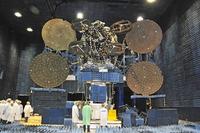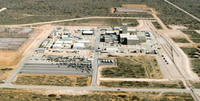-
New report urges policy overhaul, transparency in offensive cyber operations
A newly released report, titled Joint Publication 3-12(R) and authored by the Joint Chiefs of Staff, has revealed that some top commanders are calling for a policy overhaul and more public transparency in offensive cyber operations, given the growing need for such operations. Some previous documents have been published on the topic, but there is no official U.S. military policy book for cyber operations.
-
-
Boeing completes testing of new anti-jamming technology

Boeing says it has proven its new anti-jamming communications technology is capable of operating as either a ground-based user terminal or satellite-based networking hub, enabling the military to send and receive secure communications at a significantly lower cost by using existing terminals and satellites.
-
-
Cockroach cyborgs use microphones to detect, trace sounds in collapsed buildings
Researchers have developed technology that allows cyborg cockroaches, or biobots, to pick up sounds with small microphones and seek out the source of the sound. The technology is designed to help emergency personnel find and rescue survivors in the aftermath of a disaster. The researchers have also developed technology that can be used as an “invisible fence” to keep the biobots in the disaster area. “In a collapsed building, sound is the best way to find survivors,” says one of the researchers.
-
-
Schools review lockdown protocols for active shooter scenarios
Schools across the country are reviewing their lockdown protocols for active shooter scenarios. In Santa Fe, New Mexico, Ortiz Middle School is encouraging educators to not only gather students within their care to safety, but if necessary to fight off an attacker if the situation permits. On 9 October, school principal Steve Baca ordered a lockdown after a security guard discovered a gun in a student’s backpack. Immediately, English teacher Alexandra Robertson locked students in her classroom, got them to help barricade the door, and she was prepared to use any object including books and chairs to fed off anyone who might try to enter the classroom.
-
-
Mental-health apps may reduce number of mass shooting events
Between 1982 and 2011, mass shootings occurred every 200 days on average. S since 2011, mass shootings have occurred every sixty-four days on average. Mass shootings have one thing in common: the culprits all suffered from mental illness and the condition was known to at least one person. New mobile app educates the public about mental illness and provides local and national resources for early intervention and treatment.
-
-
ICE offices subscribed to national license-plate database in violation of DHS policy
In February, DHS officials dropped a controversial bidwhich would have allowed the department to access a national license-plate database, citing possible violation of Americans’ civil liberties. Soon after, DHS officials established a policy which required similar plans to be reviewed by department privacy officers. Roughly two months after that policy was put in place, officials with DHS’s Newark and Houston field offices of the Immigration and Customs Enforcement(ICE) agency purchased subscriptions for a commercially run national license-plate database without approval from DHS’ privacy office.
-
-
Connecticut and Kansas implement next-gen 911 system
Connecticut and Kansas are both currently installing the next generation of 911 telephone systems (NG911) in different cycles, but both are seeing the added benefits of the evolved system.NG911 will allow both states to offer the services of up-to-the-second multimedia information, including cell phone texts and video, as responders rush to an emergency site.
-
-
Los Angeles mayor says fire response times are too slow
Citing new research and statistics, Los Angeles Mayor Eric Garcetti claimed that previous fire station response times “stunk” and that with a new program in place, the Los Angeles Fire Department (LAFD) would be able to cut those responses considerably. The new FireStat program had revealed that the responses were considerably slower than what former Fire Chief Brian Cummings had been reporting.
-
-
Legal framework needed to govern soon-to-arrive autonomous killer drones: Experts
With about 8,000 unmanned aircrafts and roughly 12,000 unmanned ground vehicles, the U.S. military boasts the world’s largest drone arsenal, followed by Israel, with China, Europe, India, and Russia in the second tier. Unmanned aerial vehicles (UAV) will pose a challenge to current international laws of warfare since someday, and sooner rather than later, they will be able to act autonomously – and kill autonomously. The international community has yet to adopt special laws to govern the use of drones in combat.
-
-
EMS drone dramatically increases survival chances of heart attack patients, accident victims
A Dutch graduate student has designed an unmanned, autonomously navigating mini airplane that can quickly deliver a defibrillator to where it is needed. When the emergency services receive a cardiac arrest call, this drone can quickly deliver a defibrillator to the emergency scene. Via a livestream video and audio connection, the drone can also provide direct feedback to the emergency services and the persons on site can be instructed how to treat the patient. The drone finds the patient’s location through the caller’s mobile phone signal and makes its way to the location using GPS. The drone can carry up to four kilograms of medical equipment.
-
-
Peekaboo, I see you: Government authority intended for terrorism is used for other purposes
The Patriot Act continues to wreak its havoc on civil liberties. Section 213 was included in the Patriot Act over the protests of privacy advocates and granted law enforcement the power to conduct a search while delaying notice to the suspect of the search. Known as a “sneak and peek” warrant, law enforcement was adamant Section 213 was needed to protect against terrorism. But the latest government report detailing the numbers of “sneak and peek” warrants reveals that out of a total of over 11,000 sneak and peek requests, only fifty-one were used for terrorism. Yet again, terrorism concerns appear to be trampling our civil liberties.
-
-
Students point to future of ocean robotics in new global game
College students from around the world demonstrated they could have a hand in shaping the future of ocean robotics as they competed in the first Maritime RobotX Challenge, which was held 24-26 October in Singapore. “Developing autonomy for surface vessels is still in its early stages, and these students have the opportunity to come up with solutions that could set new standards in this field,” said Assistant Chief of Naval Research Capt. Rob Palisin, who helped judge the competition. “In turn, the Navy gets the chance to observe the best young engineers in action and learn from their approaches.”
-
-
Next-generation technology for first responders: intuitive, instinctive, and interoperable
DHS’s Science and Technology Directorate (S&T) has a vision for a new age of first responders, a vision which will enable first responders and their technology to be more intuitive, instinctive, and interoperable.TheNext-Generation First Responder suit will incorporates wearables, the Internet, and cellular connectivity, along with multiple environmental and biological sensors to help firefighters, law enforcement, and aid workers, better perform their jobs safely.
-
-
Law enforcement: Apple iOS 8 software would hinder efforts to keep public safety

With its new iOS 8 operating software, Apple is making it more difficult for law enforcement to engage in surveillance of users of iOS8 smartphones. Apple has announced that photos, e-mail, contacts, and other personal information will now be encrypted, using the user’s very own passwords — meaning that Apple will no longer be able to respond to government warrants for the extraction of data.
-
-
U.S. planning expansion of nuclear production in the face of safety concerns

Despite the release of a damning report regarding the 14 February nuclear waste accident at the Waste Isolation Pilot Plant (WIPP) near Carlsbad, New Mexico by the U.S. Department of Energy (DOE), the government is planning ramped-up production of nuclear weapons cores, a move which is raising red flags for those calling for reform of nuclear production and storage procedures.
-
More headlines
The long view
Why Was Pacific Northwest Home to So Many Serial Killers?
By Jacob Sweet
Ted Bundy, Gary Ridgway, George Russell, Israel Keyes, and Robert Lee Yates were serial killers who grew up in the Pacific Northwest in the shadow of smelters which spewed plumes of lead, arsenic, and cadmium into the air. As a young man, Charles Manson spent ten years at a nearby prison, where lead has seeped into the soil. The idea of a correlation between early exposure to lead and higher crime rates is not new. Fraser doesn’t explicitly support the lead-crime hypothesis, but in a nimble, haunting narrative, she argues that the connections between an unfettered pollution and violent crime warrant scrutiny.
Bookshelf: Smartphones Shape War in Hyperconnected World
By Kathryn Brimblecombe-Fox
The smartphone is helping to shape the conduct and representation of contemporary war. A new book argues that as an operative device, the smartphone is now “being used as a central weapon of war.”
